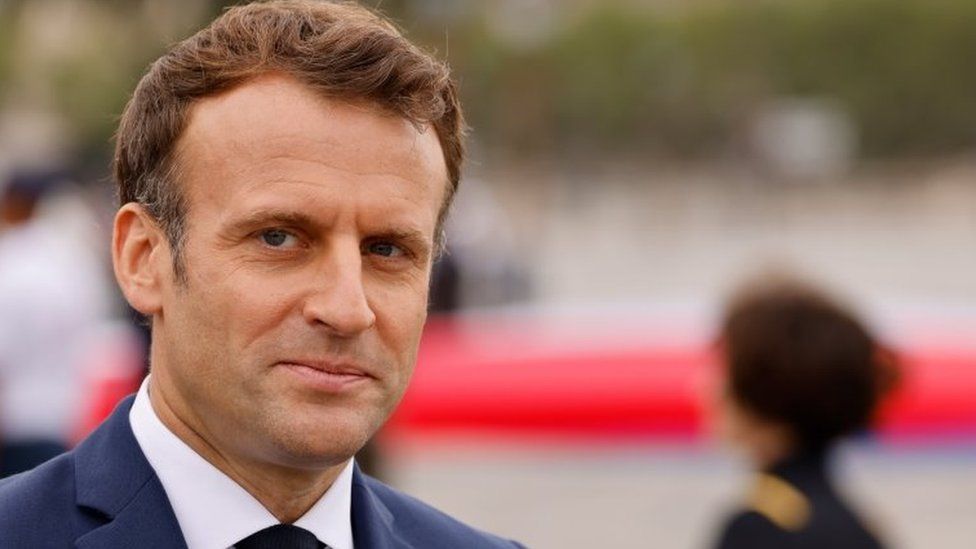Forecasts show French President Emmanuel Macron’s alliance won the most seats in the latest round of parliamentary elections. French President Emmanuel Macron’s centrist coalition lost its majority despite taking the most seats in Sunday’s final game of parliamentary elections. At the same time, the far-right National Rally appeared to be making big gains. Based on partial results, the projections show Macron’s candidates would win between 200 and 250 seats – far less than the 289 needed to have an absolute majority in the National Assembly, France’s most powerful parliament building.
The situation, which is unusual in France, is expected to complicate Mr. Macron’s political maneuvering if the forecasts come true. A new coalition – made up of the far left, the Socialists, and the Greens – is expected to become the main opposition force with about 150 to 200 seats. National Rally is expected to register a huge increase with possibly more than 80 seats, up from eight. Polls were conducted nationwide to select the 577 members of the National Assembly.

The strong performance of both the National Rally and the left-wing coalition, led by far-left leader Jean-Luc Melenchon, is expected to make it harder for Macron to implement the plan on which he was re-elected in May, including tax cuts and hikes. France’s retirement age is from 62 to 65. National Rally leader Marine Le Pen, who lost to Macron in the presidential election in May, was re-elected in her stronghold of Hénin-Beaumont, in northern France.
“Macron’s adventure has ended,” said Ms. Le Pen. The group of National Rally lawmakers “will be by far the largest in the history of our political family.” Acting National Rally President Jordan Bardella likened his party’s performance to a ‘tsunami’. “Tonight’s message is that the French people have made Emmanuel Macron a minority president,” he said on TF1 television. “It is the electoral failure of anachronism,” said Mr. Melenchon.
Macron’s government will still be able to govern, but only by negotiating with lawmakers. The centrists could try to deal with center-left and Conservative party lawmakers on a case-by-case basis — to prevent opposition lawmakers from being numerous enough to reject the proposed measures. The government could occasionally use a special bar of the French constitution to pass a law without a vote.
Government spokesman Olivia Grégoire said on France 2 television, “We have seen better evenings”. “This is a disappointing top spot, but still a top spot,” she said. “We are extending a helping hand to anyone who sees fit to move that country forward,” she said, referring in particular to the Republican party, which is expected to have fewer seats than the far right. People queue to vote at a polling station in Paris. Interior Minister Gérald Darmanin, who himself won a seat in his district in northern France, emphasized that Mr. Mélenchon “lost his bet” to win the election. Prime Minister Elisabeth Borne also won a seat in western France.
A similar situation arose in 1988 under Socialist President Francois Mitterrand, who then had to seek support from the Communists or the Centrists to pass laws. These parliamentary elections were again largely determined by voter apathy – more than half of the voters stayed home. Audrey Paillet, 19, who cast her vote in Boussy-Saint-Antoine in southeastern Paris, was saddened that so few people came. “Some people have fought to vote. It’s a shame most young people don’t,” she said. Macron gave a powerfully choreographed plea to voters from the tarmac earlier this week ahead of a trip to Romania and Ukraine. He warned that an inconclusive election, or a pending parliament, would endanger the nation.
“In these difficult times, the choice you will make this Sunday is more important than ever,” he said on Tuesday as the presidential plane waited grimly in the background to visit French troops stationed near Ukraine. “Nothing would be worse than adding French disorder to the world’s disorder,” he said. Some voters agreed, arguing against electing candidates at the political extremes that are gaining popularity. Others argued that the French system, which grants broad powers to the president, should give more voice to the multi-faceted parliament and function with more control over the presidential Elysee Palace and its resident.
“I am not afraid to have a National Assembly that is more divided between different parties. I hope for a more parliamentary and less presidential regime, as you can have in other countries,” said Simon Louis, an engineer who voted in the south of Paris. “Disappointment was evident on the night of the first round for presidential party leaders,” said Martin Quencez, a political analyst at The German Marshall Fund of the United States. Mr. Macron’s failure to gain a majority could have ramifications for Europe. It could mean the end of President Macron, the continental statesman. Analysts predict that the French leader will have to focus more on his domestic agenda than his foreign policy for the rest of his tenure.

